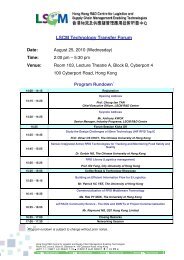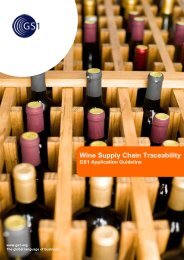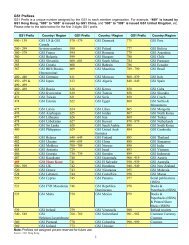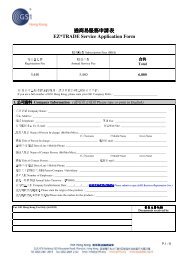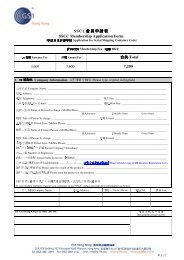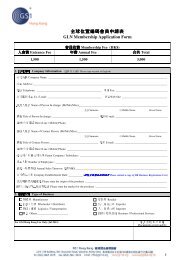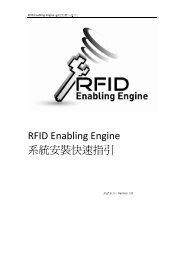ECR AP - GS1 Hong Kong Supply Chain Management
ECR AP - GS1 Hong Kong Supply Chain Management
ECR AP - GS1 Hong Kong Supply Chain Management
Create successful ePaper yourself
Turn your PDF publications into a flip-book with our unique Google optimized e-Paper software.
Chris: Back to talent development. What do you think it is best<br />
practice What should companies do to attract the best talent and<br />
help them grow in this fast growing market<br />
Harish Manwani: I am sure there are many best practices in companies.<br />
From our point of view:<br />
1. Recruiting talent: we take 800<br />
management trainees each year and<br />
most of them are in emerging markets<br />
now. We believe that building<br />
local talents is critical. Also you have<br />
to understand the 80% of the population<br />
is here so there are a lot of talented<br />
people<br />
2. Making sure that you train people<br />
a. send them to training etc. b. you<br />
have to leverage the power of our<br />
presence in 170 markets.<br />
The good news is that 90% of our employees are local, but large<br />
numbers of them have worked outside.<br />
3. We have to change the way we look at talent: Earlier, multinational<br />
said Think Global Act Local. It has to change. I do not<br />
want people sitting in China thinking global. I want them to think<br />
local. Consumers in China won’t say that I am a global consumer.<br />
So you have to THINK LOCAL and at the same time ACT GLOB-<br />
AL. It is very important to build talent with local insight. The balance<br />
between local and global is absolutely critical. Building local<br />
insight and thinking local is critical. In India when you join as a<br />
management trainee from anywhere from the world you spend 2<br />
months living in a village, actually working on community projects<br />
in villages. Once trainees do it they love it. This is how you keep in<br />
touch. You cannot become a marketer unless you sell soap in the<br />
villages. This is a value system that makes good successful businesses<br />
and builds talent.<br />
Chris: I don’t think Harish knows this, but I started my career as<br />
Unilever <strong>Management</strong> trainee! How about you Scott How do you<br />
attract and retain talent<br />
Scott Price: I did not actually start as Unilever Trainee but as Coca-<br />
Cola trainee! The demographics of workforce and the demand dynamics<br />
has changed dramatically. You used to have time to develop<br />
people before they were tasked with financially huge brands. With<br />
the speed that the multinationals came to Asia they all built multibillion<br />
businesses. But the education processes was not able to keep<br />
up. We are all struggling and there is a race for talent. The demographics<br />
also change dramatically. You have markets where the<br />
aging of the population is significant. You have markets where females<br />
are not allowed to engage in the workforce. In Walmart we<br />
try to address these gaps. We have training programs for females.<br />
But the net at the end is eventually you need a more locally empowered<br />
talent pool. 99% of our employees are local but we have higher<br />
turnover rate. So we try to figure out programs to more engage talent<br />
in long terms careers. I think it will take 20 years until the<br />
education and the experience curve caches up with the demand.<br />
Chris Cave Jones Scott Price Harish Manwani<br />
Audience question (Ivett Nagy): I am very frustrated as a shopper<br />
when I do not find my product on the shelf. I know from <strong>ECR</strong> that<br />
you spend a lot of money on supply chain and somehow it still does<br />
not work properly. What are you going to do about it<br />
Scott Price: Oops! In fact I met several suppliers on this topic yesterday.<br />
I feel for them. It is not easy.<br />
Glenn Jordan: Vice Versa<br />
Harish Manwani: I think it is such as<br />
important point. We talk about strategy,<br />
but execution is strategy in our<br />
business. If you cannot deliver the<br />
right product to the right shelf in the<br />
right channel every day you won’t<br />
win. I am sure everybody in our business<br />
understands that our P/L is determined<br />
by the last mile of our business.<br />
I really believe that the work<br />
we do with partners to try to connect our supply chain is helping us<br />
doing this. I do not say that it is perfect. If it was than we would not<br />
have a job. This is an on-going thing. Expectation from service level<br />
is rising and honestly it is good for our businesses to have higher<br />
and higher expectations.<br />
Glenn Jordan: It has to be on the top of our agenda. It is an issue of<br />
capabilities, an issue of dislocation between the speed we are growing<br />
and the speed we build capabilities and it is a good reminder<br />
that we have to work collaboratively. It has to be at the top of our<br />
agenda.<br />
Seah Kian Peng: We still have to make sure that we do our basics<br />
better. Going back to Human Capital: It is key in everything. I<br />
would like to touch this point: we see that people join a workplace<br />
for a variety of reasons: remuneration, career aspects are important<br />
but other aspects are increasing: whether they believe in the values<br />
of the company, such as sustainability.<br />
Glenn Jordan: 20 years ago we never had this challenge with talent.<br />
The reality is that there will be a lot of rotation, mobility. So the<br />
companies that people will choose are the ones who can think differently.<br />
So companies have to build processes which allow that to<br />
happen without interrupting the business.<br />
Harish Manwani: In the past we always talked about loyalty as premium.<br />
It has to be shifted from loyalty to commitment.<br />
Glenn Jordan: We think about formation and not organisation.<br />
Scott: Price: One customer gave us this feedback in China:” We<br />
want you to have this cereal. This one but without the raisins.” Customers<br />
are becoming incredibly demanding. We used to think that<br />
50,000 SKUs in a store were enough to satisfy our customers. But<br />
that is why people rushing on-line. Because they can find 100,000 -<br />
1 million SKUs. So it is not only a supply chain challenge but also<br />
customers are demanding much more than a retailer could potentially<br />
provide. So it is an interesting dynamic. Customer demand is a<br />
very powerful engine of change.<br />
27<br />
27




